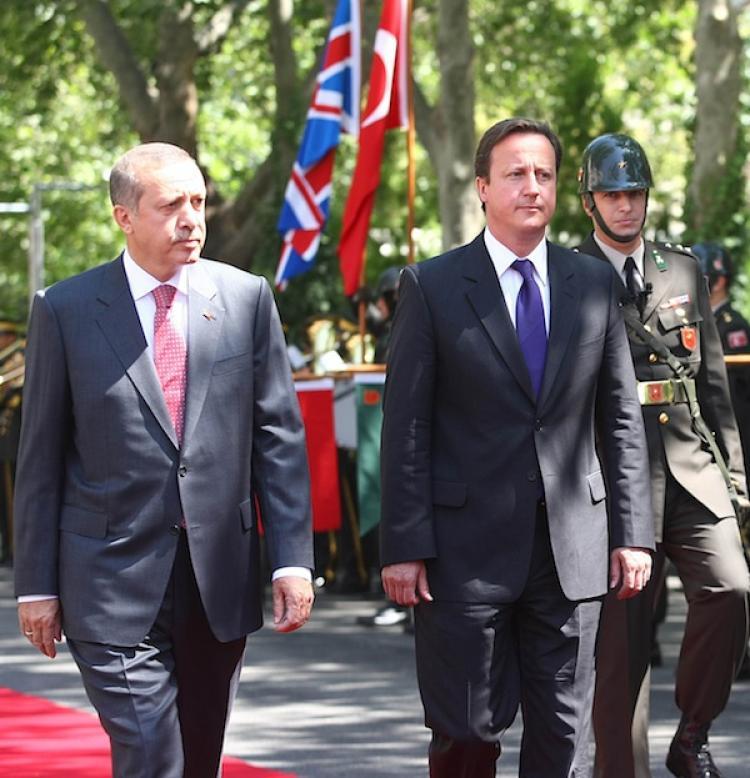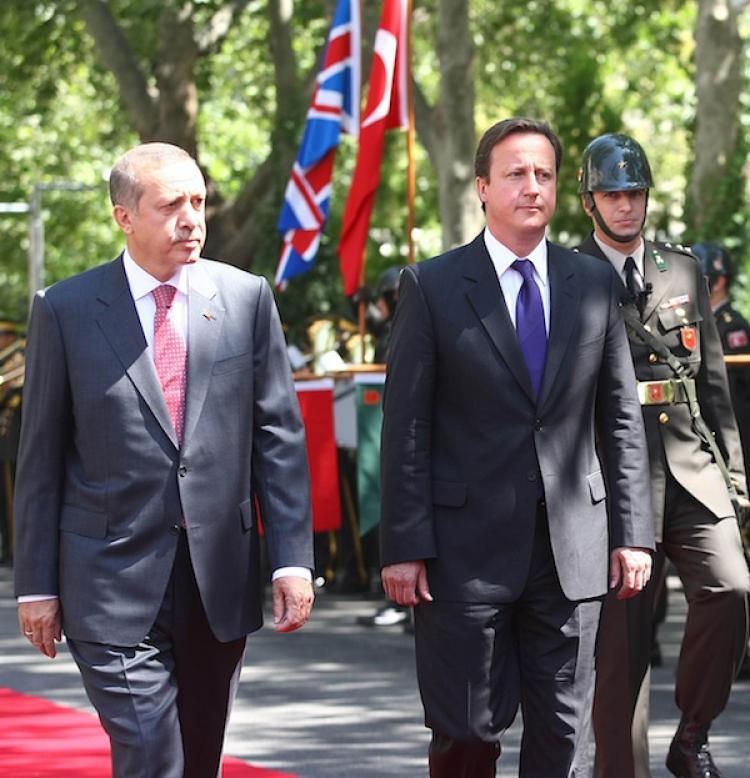British Prime Minister David Cameron said on Tuesday he would “fight” for Turkey’s bid to enter the European Union, a stance that has caused tension within the union.
“I am here to make the case for Turkish membership in the EU and to fight for it,” Cameron told reporters during his one-day visit to Ankara. “I will remain your strongest possible advocate for EU membership and for greater influence at the top table of European diplomacy.”
One of the purposes of Cameron’s trip to Turkey was to establish a new partnership between London and Ankara, which Cameron called “vital” to the U.K.’s economy, security and politics.
Turkey started negotiations to join the EU in 2005, but talks have been slow due to disagreements between some member nations over Turkey’s entrance.
Germany, for one, fears that the union will be threatened by mass labor emigration from Turkey if it is allowed to join the EU and has offered the mainly Muslim nation of 70 million a “privileged partnership” instead of full membership. About 3 million Turks live in Germany, Turkey’s biggest trade partner and investor. France also opposes Turkey joining the EU.
“It makes me angry that your progress toward EU membership can be frustrated in the way that it has been,” said the British PM.
“My view is clear. I believe it’s just wrong to say that Turkey can guard the camp but not be allowed to sit in the tent.”
The United States and Britain have long supported Turkey’s EU ambitions for strategic reasons, such as oil and gas routes for the EU. Turkey, a NATO member, is also important player in building peace in Afghanistan.
Sticking points slowing Ankara’s entrance into the EU including the lack of progress in normalizing relations with Cyprus—Cyprus joined the EU in 2004—and Turkey’s increasing support for pro-Islamic parties.
Cameron criticized Turkey’s detractors calling them protectionists and “prejudiced,” saying that they “willfully misunderstood Islam and see no difference between real Islam and the distorted version of the extremists.”
However, Cameron also told Turkish officials to “aggressively” deal with economic and political reform to fulfill its requirements for EU membership.
Perhaps to test of Turkey’s commitment to EU positions, Cameron also said he hoped Turkey will support sanctions imposed against Iran designed to prevent the development of a nuclear weapon’s program.
“So we need Turkey’s help now in making it clear to Iran just how serious we are about engaging fully with the international community,” he said.
Iran will meet Turkey and Brazil in the coming days to push forward discussions on a nuclear-fuel swap deal the three nations agreed to in May. The deal would allow Iran to ship low-enriched uranium to Turkey in exchange for nuclear fuel for its research reactor.
Last October, fuel swap deal was a central to talks between Russia, France and the United States over how to deal with Iran. The failure to reach an agreement led to fresh sanctions being imposed on Iran first by the United Nations, then by the U.S., EU and Canada.
“I am here to make the case for Turkish membership in the EU and to fight for it,” Cameron told reporters during his one-day visit to Ankara. “I will remain your strongest possible advocate for EU membership and for greater influence at the top table of European diplomacy.”
One of the purposes of Cameron’s trip to Turkey was to establish a new partnership between London and Ankara, which Cameron called “vital” to the U.K.’s economy, security and politics.
Turkey started negotiations to join the EU in 2005, but talks have been slow due to disagreements between some member nations over Turkey’s entrance.
Germany, for one, fears that the union will be threatened by mass labor emigration from Turkey if it is allowed to join the EU and has offered the mainly Muslim nation of 70 million a “privileged partnership” instead of full membership. About 3 million Turks live in Germany, Turkey’s biggest trade partner and investor. France also opposes Turkey joining the EU.
“It makes me angry that your progress toward EU membership can be frustrated in the way that it has been,” said the British PM.
“My view is clear. I believe it’s just wrong to say that Turkey can guard the camp but not be allowed to sit in the tent.”
The United States and Britain have long supported Turkey’s EU ambitions for strategic reasons, such as oil and gas routes for the EU. Turkey, a NATO member, is also important player in building peace in Afghanistan.
Sticking points slowing Ankara’s entrance into the EU including the lack of progress in normalizing relations with Cyprus—Cyprus joined the EU in 2004—and Turkey’s increasing support for pro-Islamic parties.
Cameron criticized Turkey’s detractors calling them protectionists and “prejudiced,” saying that they “willfully misunderstood Islam and see no difference between real Islam and the distorted version of the extremists.”
However, Cameron also told Turkish officials to “aggressively” deal with economic and political reform to fulfill its requirements for EU membership.
Perhaps to test of Turkey’s commitment to EU positions, Cameron also said he hoped Turkey will support sanctions imposed against Iran designed to prevent the development of a nuclear weapon’s program.
“So we need Turkey’s help now in making it clear to Iran just how serious we are about engaging fully with the international community,” he said.
Iran will meet Turkey and Brazil in the coming days to push forward discussions on a nuclear-fuel swap deal the three nations agreed to in May. The deal would allow Iran to ship low-enriched uranium to Turkey in exchange for nuclear fuel for its research reactor.
Last October, fuel swap deal was a central to talks between Russia, France and the United States over how to deal with Iran. The failure to reach an agreement led to fresh sanctions being imposed on Iran first by the United Nations, then by the U.S., EU and Canada.





